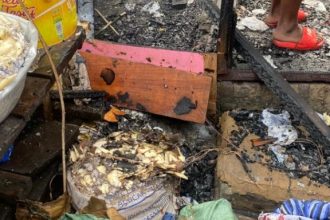More than half the number of burials in Accra and Tema are without permits, a pilot survey by the Ghana Statistical Service (GSS) has indicated.
Data from 38 police jurisdictions in Accra and Tema were collated to help authorities to determine information on mortalities under the Ghana Mortality Statistics Project.
The purpose was to determine deaths that are not recorded in the country.
Data on a total of 509 cases between February and July 2020 were used for the preliminary study.
The findings indicated 61.3% of the reported cases of death by the police were designated as undetermined and required coroner investigation.
Further analysis however revealed that autopsy investigations were not conducted for about 47% of the reported cases to determine the cause of death.
Additionally, it was discovered that about 7% of the deaths recorded by the police were due to road traffic accidents while homicides and suicides constituted 3.1% and 0.6% respectively.
The rest were attributed to other causes.
Explaining further, Mr Omar Seidu, the Head of Demographics and Coordinator for the (SDGs) at the GSS who supervised the study indicated that the areas were chosen purposively, and may not reflect the situation across the entire country.
“More than half of them, there is no burial permit issued which means that they were not taken through any authority to receive burial permit and they then went ahead to bury.
“It was recorded in the police report, so the people went to the police station and gave a report on it but then it is unregistered with the civil registration and vital statistics system at Birth and Deaths Registry, but that has not been done,” he stated.
These lapses, he noted, pose a threat to identifying data stock and use, and therefore require the urgent need to ensure the registration and generation of accurate, comprehensive and timely vital statistics on road traffic, violent and external deaths.
Ghana’s civil registration system, for example, suffers a number of limitations especially in the area of death registration and generation of vital statistics including the cause of death statistics.
Mr Seidu pointed out that it is a civic responsibility for the public to report to appropriate authorities to conduct the necessary registrations when deaths occur.
He wants a linkage between police and the death registry to capture cases of death efficiently.
He has advised postmortem analysis on every death and strict implementation of laws that require death certificates before burials at cemeteries.
“If you bring the body to a cemetery and it is rejected because there is no burial permit, you would be compelled to get a burial permit and to get a burial permit it needs to be registered with the Births and Deaths Registry,” he admonished.
The Ghana Statistical Service and its partners with funding support from the Bloomberg Philanthropies implemented the Ghana Mortality Statistics Project under the Data for Health Initiative (D4H) Global Grants Project to establish a system of routine data collection for road traffic, violent and external deaths.
The study is expected to be expanded to cover the entire country in the next two years.
This is to help in designing health policy, planning, provision of benchmark data for establishing national identity systems and provision of some government services.
The GSS was concerned that in many African countries, national civil registration systems are not fully functional and the vital statistics generated are not of acceptable international standards.
Analysis of the different sources of data on mortality in the country shows that mortality statistics are mainly from health facilities.
Such data is however only a fraction of the deaths that occur in the country, as about seventy per cent of all deaths occur outside health facilities.
Additionally, data from road traffic, violent and external causes of death appear to be missing from the available sources of data on mortality.
















